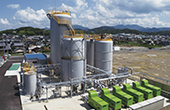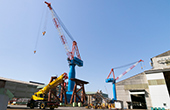Imagining the future and bringing it to life through crafts—that was the concept behind the “School for a Compassionate Future,” a workshop for elementary school children held in September 2024 at the Ehime Prefectural Science Museum in Niihama, Ehime Prefecture. Hosted by Sumitomo Heavy Industries, a company with over 130 years of experience and expertise in manufacturing, the event also highlighted Niihama as the birthplace of the company.
The two-and-a-half-hour workshop was divided into four parts: (1) a lecture exploring challenges facing individuals and society, and the technologies available to envision a “compassionate future,” (2) group discussion using cards to share ideas about the future the participants hope to create, (3) a hands-on session crafting models to bring those ideas to life, and (4) presentation of the completed craftworks.
To encourage group discussions, the children were given special cards. These featured “people who may face challenges,” such as individuals living far from the town center or shopkeepers with specific concerns, as well as “technologies and tools that could help address these challenges.” These included drones, sensors, the Internet of Things (IoT), and artificial intelligence (AI). Dubbed “Technodea Cards,” their name is a blend of technology and ideas.
Around 50 different materials were provided for the crafts, including paper cups, glasses, balls, paper boxes, wooden gears, shoes, leaves, and colored cellophane. This diverse selection was designed to encourage children to creatively bring their ideas to life.
If the children encounter any challenges or have questions, they can consult a generative AI for solutions via a tablet. Staff members, stationed near each group, assist the children in posing questions to the AI and then provide feedback on the responses.
This workshop embodies STEAM education, which blends science, technology, engineering, arts and mathematics with creativity. It is an educational approach that integrates multiple disciplines, represented by the acronym of Science, Technology, Engineering, Arts, and Mathematics.
STEAM education originated from STEM education, which began in the U.S. in the 1990s with the goal of developing scientific and technological talent. With the addition of the arts and liberal arts (Arts), STEAM education is based on the belief that integrating these disciplines fosters creative thinking.
In recent years, there has been a growing emphasis on science and technology-oriented education, as seen in the mandatory programming classes in elementary and junior high schools in Japan. Development of thinking skills is key. In the real world, it is crucial to analyze the underlying causes of problems and think critically about how to solve them, making the world more convenient and compassionate.
The School for a Compassionate Future aims to foster “thinking skills” through STEAM education and provide children with an exciting hands-on experience of the “joy of manufacturing” through crafts.
Therefore, Sumitomo Heavy Industries put a lot of thought into the workshop’s content. With the support of CANVAS (operated by Laugh & Peace Mother), an organization specializing in developing workshops for children, the program outlined above was created.
The “School for a Compassionate Future” has been held since 2023, generating a stream of innovative ideas that adults might never have imagined. For example, in 2023, “flying shoes” were “invented” by combining athletic shoes with propellers. In 2024, “virtual reality (VR) and tactile sense reproduction technology” were “developed” to help people with animal allergies better connect with animals.
The future Sumitomo Heavy Industries aims to create is one where manufacturing evolves through ideas that fill people and society with compassion, achieved by introducing more children to the “joy of manufacturing.”
To this end, the company believes that promoting STEAM education in local communities is crucial. Educational opportunities to foster “thinking skills,” like those offered by STEAM education, are still insufficient in society. This is why the company established the “School for a Compassionate Future” to take the lead in this effort.
In 2023 and 2024, this initiative, launched in Niihama City, involved over 100 elementary school children. The company is considering holding workshops in other regions in the future. Contributing to local communities, nurturing people, and building the future—the challenge for manufacturing companies continues.

 EN
EN


 Journalist Junichiro Hori on Sumitomo’s DNA
Journalist Junichiro Hori on Sumitomo’s DNA




